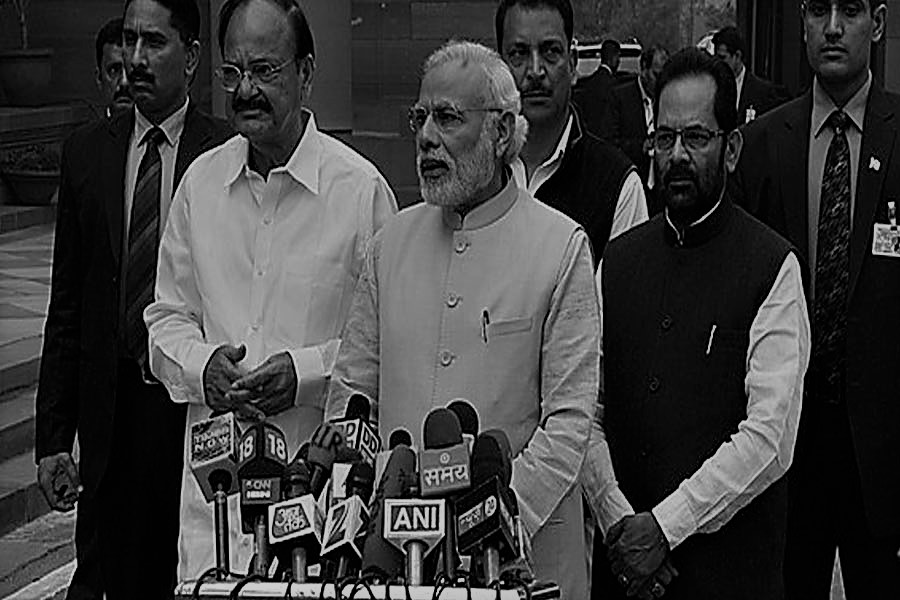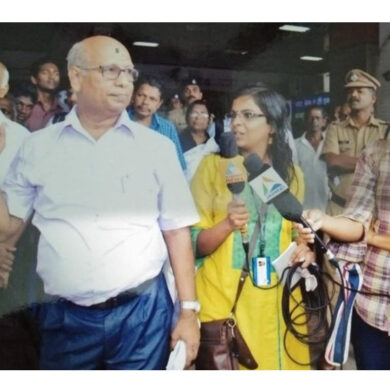The gag order issued by the Information & Broadcasting ministry to news channels asking them to refrain from broadcasting content which is “likely to instigate violence or which promotes an anti-national attitude” smacks of a colonial mindset.
The order, the second in a fortnight, specifically asks the channels “not to show content that contains anything which may affect the integrity of the nation, maligns or slanders any individual in person or certain groups, segments of social public and moral life of the country”.
The phrase ‘anything which may affect the integrity of the nation’ is so sweeping and vague that anything can be interpreted as affecting the integrity of the nation, particularly so when the NDA government has been viewing even the most innocuous thing as offending to nationhood.
Further, the line separating the government and the nation has become so thin under the Modi dispensation that even criticism against the government can be taken to mean subversive activity against the nation.
In fact, this has been a major sticking point in the way the government looks at dissent. Intolerance to dissent has become a cardinal approach, which prompts the government to interpret anything as anti-national. And even parliament has not been spared.
The growing intolerance of the protests against the Citizenship Amendment Act marks a low point in the Modi government’s approach towards dissent. In fact, the term ‘urban-naxals’ has been very effectively used to paint dissent with a broad brush.
But with the agitation against CAA engulfing campuses and streets across the country, the government has let go of all restraints in its abrasive approach towards the opposing view point. Whether it is closing down of metro stations, suspension of internet or promulgation of prohibitory orders, everything betrays a certain distrust on the part of the government.
Earlier, this was being done mainly in Kashmir to suppress dissent against the abrogation of Article 370 that bestowed special status to Jammu & Kashmir. But success there—if at all it can be described so—has emboldened the government to employ that on an all-India basis.
Closing down of metros is a most brazen attempt to curtail the freedom of movement, which is a fundamental right granted under the Constitution. But this is being resorted to on a daily basis as the government interprets—rather misinterprets—freedom of movement to be against the interest of national security.
Similarly, jamming of mobile communication and internet is a complete violation of the freedom of expression, another fundamental right considered sacrosanct all this while, but the Modi government has no qualms about resorting to such tactics, taking umbrage under the interpretation of national interest.
The clamping down of Section 144 is another blatantly anti-democratic measure, which is in fact a vestige of colonial rule. Independent India should have in all fairness ended this imperialist practice, but the draconian rule is being used more frequently after the colonial masters have left the Indian shores. This has become a most effective tool in the hands of authoritarian administrations to kill dissent.
The Karnataka High Court has, in fact, posed this question as to how a government can assume that every protest would turn violent and on that basis disallow such a protest. The court asked the Karnataka government whether it intended to ban each and every protest and questioned how permission for a protest following due process was withdrawn.
The question came up as the court was hearing a plea filed by Congress Rajya Sabha MP Rajeev Gowda against the imposition of Section 144 across the state in the wake of protests against the new citizenship law. The High Court has promised to examine the legality of the Section 144 order put by the government.
It is high time that such vestiges of colonial rule are abolished from our criminal procedure code as these were meant to subserve the interests of British rather than the natives. But unfortunately, successive governments in independent India are behaving more brazenly than their colonial masters and have in fact become the perpetrators of a new tyranny against their own people.







